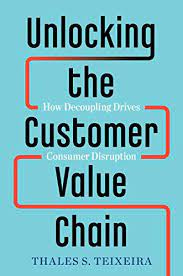Introduction
Welcome to The ContraMind Code.
The ContraMind Code provides you with a system of principles, signals, and ideas to aid you in your pursuit of excellence.
The Newsletter shares the source code, through quick snapshots, for a systems thinking approach to be the best in what you do.
The Code helps you reboot and reimagine your thinking by learning from the best and enables you to draw a blueprint on what it takes to get extraordinary things done.
Unlocking the Customer Value Chain
by Thales S. Teixeira
This book by Prof. Thales Teixeira successfully reveals the power of decoupling and how it disrupts existing businesses and business models. He explains how companies can engineer decoupling, spot the next wave of disruption and address disruption as a process rather than focusing on companies like Google or Facebook.
Building a Business on the Power of Stories
Narayan Parasuram is the Co-Founder and Creative Director of the Karadi Tales Company. He is also a singer, a music director, an independent movie producer, and a teacher. Narayan is a graduate of the IIT Bombay. He holds a Masters's degree in Material Science and a Diploma in Sound Engineering from Clemson University.
In this episode, Narayan talks to us about Audiobooks and Storytelling traditions, the principles of storytelling at Karadi Tales, the power of lifelong learning via non-institutions, the origins and production of GGBB and the differences between Institutional and Non-Institutional Education in India among many other topics.
Listen to the full episode on:
Learning from Failure
by Ayelet Fishbach
Prof. Ayelet Fishbach is Jeffrey Breakenridge Keller, Professor of Behavioral Science and Marketing and IBM Corporation Faculty Scholar at Booth School Business, University of Chicago. Prof. Fishbach studies social psychology, management and consumer behaviour. She is an expert on motivation and decision making.
In this video, Prof. Ayelet talks about the startling fact that most of us don’t learn from failure! That failure is a problem with self-esteem, people don’t feel good about failing, and, therefore, tune out. Interestingly, people observe and learn from others’ failures but don’t learn from their failures. Also, if they are encouraged to learn from failures through sharing, by telling others about their failures, then the chances of learning from failure are high.
Disrupting Processes And Journeys.
When we think back on the points from the book Unlocking The Customer Value Chain, it emphasises the need to decouple the discovery, evaluation, choosing, buying and using of products. It talks about the need to disrupt some of these processes and journeys. But, the inherent chances of failure are why established firms that are industry leaders fail to do so. Even people in many of these firms fail to often disrupt age-old processes that need a refresh and rethink. The fear of failure and damage to one’s reputation is the reason.
Taking a cue from Prof. Ayelet Fisbach’s view, it is good to encourage people to learn from other people’s failures or from different industries or companies that have failed to disrupt themselves. The importance of sharing stories of failure with executives of these firms who were unable to disrupt themselves is a great way to start a conversation for change, making them more comfortable to think of new methods and processes of doing things and letting them know failure is bound to happen but is acceptable instead it is encouraged in the culture is very important.
Some of the lessons we learnt from this week’s mission:
Addressing disruption as a process rather than focusing on other companies, competitive pressures, or current problems is key to decoupling the customer value chain. Only then can we create new business models in industries or specifically in companies.
Look for lifelong learning from non-institutions rather than the traditional institutions.
Learning from failure is very hard. The best way to learn from failure is to observe and learn from other’s failures. Failure is best understood when it is shared or told to others.










